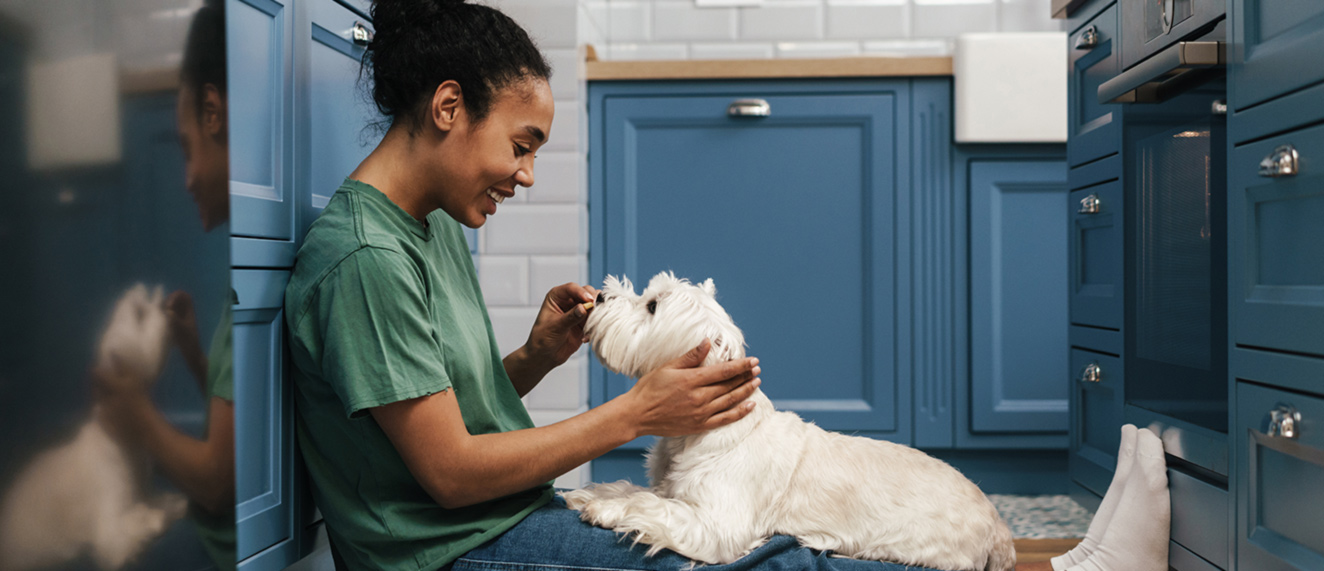Pet ownership in Canada is on the rise, with millennials dominating the pet market and viewing their dogs, cats, or other pets as valued members of the family. Between 2020 and 2022, dog and cat populations increased from 7.7 million to 7.9 million and 8.1 million to 8.5 million, respectively, according to a 2022 study by the Canadian Animal Health Institute.
With millions of pets joining their owners in the search for a perfect home, we spoke to REALTORS® across the country about how our favourite companions affect the home buying process.
Pet owners looking for the purr-fect fit
For many people, pet considerations can be among the most important factors when it comes down to home purchasing decisions.
“I have even dealt with a buyer who built a custom home with a dog shower area in the garage,” says Jacqui Rostek Holder, associate broker and a REALTOR® with Royal LePage Atlantic in Halifax. “When the ‘furbabies’ are being discussed with me, there are typically certain must haves that come with it. Not all pet owners are like this, but I have come across a fair share. I also had a dog owner that had a request about the lot orientation so the dog had afternoon shade in the yard.”
When dog owners are looking at a house, many will want a fenced yard and an opening into the fenced area so the dog can be let out easily.

“Proximity to an off-leash park is a pretty common request,” says Janice Fox, a REALTOR® and broker of record at Hazelton Real Estate Inc. “In a condo, the rules and regulations with respect to pets need to be discussed before even looking at a building.”
Fox says last year she worked with a couple who were empty nesters and very attached to their large dog. They had a very specific request – to be in a condo, but on the ground floor with a fenced-in yard and a gate in the fence, so they wouldn’t have to walk the dog through the condo lobby.
“It took a bit of hunting, but we found the perfect spot,” she says. “In a condo building, often people ask if a dog-walking service can access the unit daily. Some buildings don’t allow pets over a certain size. Other buildings don’t allow pets to walk in the lobby or elevators, so there are small pet strollers that people use to carry pets.”
Sandra Rafferty, a REALTOR® and broker/owner with Greater Calgary Real Estate, says considerations for pet owners buying a home also include pet-friendly flooring that’s easy to clean and spaces for beds or cages, litter boxes and feeding areas. As well, proximity to a veterinary clinic, pet supply store and grooming service are important. For those who have a noisy animal, such as a dog who barks a lot or a chatty bird, then buyers might be seeking a home where the noise won’t be as much of an issue.

Claws and effect, how sellers are impacted
Rafferty says pets impact sellers as well.
“Sellers are ideally trying to create a welcoming environment to all potential buyers, including those with and without pets. They need to ensure there are no lingering pet odours, which can truly be a turn-off,” she says. “Sellers who have pets need to be mindful when allowing buyers to view their homes. It’s crucial to provide a safe and secure space for pets that may be easily frightened or anxious during showings. Buyers who had a bad experience in a home may too easily pass on it when this could have been an ideal home for them.”
Are there signs of damage on the floors and walls caused by pets? Addressing these issues before listing the home can potentially save time, negotiation hassles, and ensure a smooth transaction.
Canadians paw-nder the options
“With the aging population, [people] start to downsize their life into a condo, and some of them rely on a small dog as their companion, especially after they become widowed,” says Michael Dewing, a REALTOR® and associate broker with RE/MAX of Lloydminster, in Lloydminster, Alta. “It is becoming more and more of an issue, as most condominiums have changed by-laws to not allow pets. Most times, the buyer is attached to their pet in a way that they become a partner, so they of course are not willing to part ways with an animal like that.

“Also increasing in prevalence is the support dog. A buyer can have a certified guide dog if they are impeded by a disability or blindness, but also can have a pet as an anxiety reducer,” he adds. “The latter can be difficult, as there aren’t as many guidelines around this area. We can almost always get an actual guide dog approved through the condo boards, as these are essentially legal everywhere the person goes.”
Making an off-fur that suits the whole family
Regardless of whether a REALTOR® is working with a buyer or seller, it’s important that they realize that the family they’re working for might have a non-human member and need to be accommodated. As always, being prepared and informed is best practice for supporting all clients.




